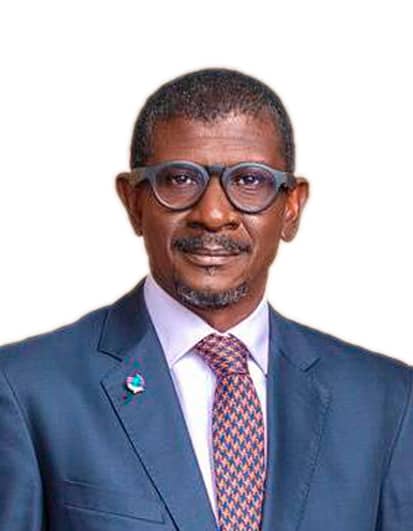Business
Zacch Adedeji: The Technocrat Who Makes the System Work

By Arabinrin Aderonke
We do not talk enough about institutions or agencies in Nigeria. The conversation is often about who holds office, who left, who is performing, and who is not. But if we are serious about building a country that works, we must change that focus. Great nations like the United States, Germany, and Japan were built not only by people but by the systems and structures they established. That is why the Tax Reform Bills is a big deal. Dr. Zacch Adedeji, Executive Chairman of the Federal Inland Revenue Service (now Nigeria Revenue Service), deserves his flowers.
In Nigeria, many laws are passed with little follow-up. Good ideas often do not survive politics. The Tax Reform Bills, signed by President Bola Ahmed Tinubu, followed a clear process. From early consultations to communication with the public and coordination with the National Assembly, the approach was structured. These policies form the base for a more fair, inclusive, and efficient tax system.
And truly, how many things do we even want to say? Where do we start? This man is trying. Dr. Zacch didn’t wait for applause before doing the work. He has focused on building a system that works, not just for the government but for the people. This tax reform is only the highlight we are all now talking about. But the real work started when he became the Executive Chairman.
He began with the agency itself. Staff morale was low, structures were loose, and the system was outdated. He reorganized departments, improved staff welfare, increased salaries, and created a culture of responsibility. The environment changed from survival to performance. He understood that if the people inside the system were not motivated, nothing on the outside would function properly.
Then he went after the process. Under his leadership, the TaxProMax platform was upgraded. New modules were added. Over 80 per cent of operations were automated. Filing became easier, records became clearer, and service delivery improved. He introduced a USSD code that allows people to retrieve their TIN and tax clearance certificates straight from their phones, with no internet being required. These are real solutions for real Nigerians.
He also spearheaded the National Single Window Project, which links tax, customs, and trade. For the first time, businesses could start seeing a more coordinated and transparent system.
In 2023, revenue collection hit ₦12.36 trillion. In 2024, it grew to ₦21.6 trillion. Not by squeezing people dry but by widening the tax net, blocking leakages, and making compliance easier. In 2025, the target is ₦25.2 trillion, and with the structure he has put in place, it is not just possible, it is planned for.
But beyond technology and revenue numbers, the Tax Boss has been consistent in saying we must not tax poverty. He pushed for exemptions for small businesses and low-income earners. He ensured that essential items like food, health, education, accommodation, and transport were VAT-free. That is leadership with empathy.
So yes, let us give him his flowers, and give them to him well. Tax Boss is not like the usual people we see in government. He came in, kept his head down, and did the work the way his boss, President Bola Ahmed Tinubu, asked him to. He didn’t chase attention, but now the results are speaking louder than any press conference.
In a country where many enter the office and leave things worse, Dr. Zacch is proof that one person can come in and truly change the story. He is showing us that the government can work if the right person is in charge. He is the kind of leader Nigeria needs more of, focused, honest, and truly working for the people. He has not only done well. He has set a new standard.
Arabinrin Aderonke Atoyebi is the technical assistant on broadcast media to the executive chairman of the Federal Inland Revenue Service
Business
NEXIM Bank Secures Bbb+ Rating from Agusto & Co., Declares ₦30.47 Billion Operating Profit

By Joel Ajayi
The Nigerian Export-Import Bank (NEXIM) has been assigned a Bbb+ rating by leading credit rating agency Agusto & Co. Limited, affirming its satisfactory financial condition and strong capacity to meet obligations relative to other development finance institutions (DFIs) in Nigeria.
For the year ended 2024, NEXIM Bank reported an operating profit of ₦30.47 billion, more than double the ₦13.75 billion recorded in the previous year. This remarkable growth underscores the Bank’s financial resilience and operational efficiency.
Established to promote Nigeria’s non-oil exports and support import-substituting businesses, NEXIM is fully owned by the Federal Government of Nigeria through equal shareholding by the Central Bank of Nigeria (CBN) and the Ministry of Finance Incorporated (MOFI).
The Bank has sustained strong liquidity and capital adequacy ratios, alongside notable growth in its loan book and equity investments. Key sectors supported include manufacturing, agriculture, solid minerals, and services.
According to Managing Director, Mr. Abba Bello, NEXIM has intensified its intervention in the non-oil export sector, disbursing over ₦495 billion and facilitating the creation and sustenance of more than 36,000 direct and indirect jobs.
Among the Bank’s key initiatives are:The Regional Sealink Project: A public-private partnership designed to improve maritime logistics across West and Central Africa. Promotion of Factoring Services: Offering alternative export financing solutions for SMEs. And Joint Project Preparation Fund (JPPF): Implemented in partnership with Afreximbank to enhance the bankability of export projects.
Additionally, NEXIM is developing tailored financing schemes for the mining sector, including Contract Mining, Equipment Leasing, and Buyers’ Credit/ECA Financing, aimed at unlocking export potential and boosting foreign exchange earnings.
With its renewed drive, NEXIM Bank remains committed to building local processing capacity, advancing Nigeria’s competitiveness in global trade, and strengthening non-oil export revenues by moving up the commodity value chain.
-

 Featured6 years ago
Featured6 years agoLampard Names New Chelsea Manager
-

 Featured5 years ago
Featured5 years agoFG To Extends Lockdown In FCT, Lagos Ogun states For 7days
-

 Featured6 years ago
Featured6 years agoChildren Custody: Court Adjourns Mike Ezuruonye, Wife’s Case To April 7
-

 Featured6 years ago
Featured6 years agoNYSC Dismisses Report Of DG’s Plan To Islamize Benue Orientation Camp
-

 Featured4 years ago
Featured4 years agoTransfer Saga: How Mikel Obi Refused to compensate me After I Linked Him Worth $4m Deal In Kuwait SC – Okafor
-
Sports3 years ago
TINUBU LAMBAST DELE MOMODU
-

 News9 months ago
News9 months agoZulu to Super Eagles B team, President Tinubu is happy with you
-
Featured6 years ago
Board urges FG to establish one-stop rehabilitation centres in 6 geopolitical zones
